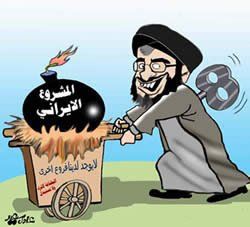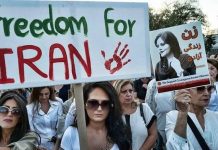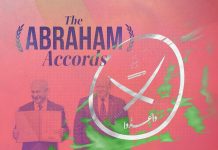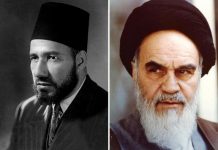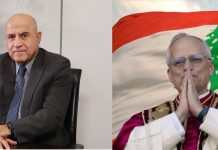Michel Aoun playing with fire over Hizbollah
Josh Wood/The National/March 25/17
BEIRUT // Lebanon sits in a region torn by conflict and its armed forces are limited. As such, it is one of the largest recipients of American military aid. And with limited economic opportunities, it is dependent on the benevolence and investment of Arabian Gulf states that also provide employment to many of its citizens.
But Lebanon is now led by a president who praises Hizbollah, the powerful Shiite group that dominates the country, is at war in Syria and is considered a terrorist group by the US and Gulf states.
To both the Gulf states and the US, Hizbollah is the strongest manifestation of Iran’s ambitions and influence in the Middle East and a force that must be confronted and stopped.
To General Michel Aoun, who was elected by parliament late last year, Hizbollah is “an essential part of defending Lebanon”. He sees Hizbollah’s arsenal as a complement to the Lebanese army, which he admits “doesn’t have the needed power to fend off” threats from Israel.
In theory, Gen Aoun took office as an ally of Hizbollah. However, this was largely seen as a marriage of political convenience, not ideology, and the president said little about the group during his first months in office.
Last month, however, Gen Aoun endorsed Hizbollah publicly and threw his support behind the group, risking Lebanon’s relations with allies in Washington and the Gulf.
The president is playing with fire.
Lebanon is the world’s fifth-largest recipient of US military aid, with more than $1 billion (Dh3.67bn) worth of equipment received since 2006.
The battles against extremists in the Nahr Al Bared Palestinian refugee camp in 2007 and more recent confrontations with ISIL and Jabhat Al Nusra along its border with Syria persuaded the Americans to provide a steady stream of weaponry, vehicles and ammunition to the Lebanese army.
But Gen Aoun’s support for Hizbollah could jeopardise all that.
While the president is traditionally a figurehead, Hizbollah’s support gives Gen Aoun’s words and actions weight, as does the large Christian political party he heads. And with his son-in-law Gebran Bassil as foreign minister – a man blamed by the Gulf for tensions last year over Hizbollah – Gen Aoun is in a position to shape Lebanon’s international relations.
While the particulars of US foreign policy under Donald Trump remain vague more than two months into his presidency, one theme has been consistent: a tougher stance on Iran.
Mr Trump has stacked his administration with hawks who want to confront Iran rather than negotiate. Lebanon’s embrace of Hizbollah will not sit well with them.
So far, the Trump administration has taken no discernible action against Lebanon. The country escaped Mr Trump’s attempted travel bans on several Muslim majority countries although it is dominated by what Washington considers a terrorist group.
However, the US has made it clear that the travel ban issue is still alive and that the list could be expanded.
Mr Trump has also pledged to move closer to Israel, which is now striking Hizbollah targets inside Syria more brazenly.
Israel has criticised America’s arms transfers donations to Lebanon. Now, with Gen Aoun’s very public backing of Hizbollah and talk of confronting Israel, Israeli leaders might try to persuade Mr Trump to halt military aid to Lebanon.
Last year, Israel alleged that US armoured personnel carriers supplied to the Lebanese army were going to Hizbollah. The administration of Barack Obama denied it.
Gen Aoun’s praise for Hizbollah could also land him in trouble with Gulf states, notably Saudi Arabia.
The kingdom last year cancelled US$4bn in grants to Lebanon’s security services, citing Hizbollah’s “hijacking” of the country.
It then led a charge against Lebanon and Hizbollah, prompting GCC states to ban their citizens from travelling to Lebanon, downgrading diplomatic ties and imposing sanctions on people and businesses connected to Hizbollah.
Saudi Arabia is furious about Hizbollah’s role in Syria and alleges that the group is backing Houthi rebel forces in Yemen.
Relations thawed after Gen Aoun was elected president in October, ending a 20-month power vacuum. The new leader soon received a Saudi diplomatic delegation in Beirut and his first trip abroad as president was to Riyadh in January.
There was hope in Lebanon that a restoration of diplomatic relations meant the arms grants would be reinstated and that Lebanon would again be friends with the Gulf states.
But that was before Gen Aoun began praising Hizbollah, the very core of the spat between Lebanon and the Gulf states. Saudi Arabia’s King Salman to cancel a trip to Beirut and Ge Aoun’s comments may have been the reason.
Hopes for normalised ties are now fading. If Gen Aoun’s words and actions result in the US and the Gulf distancing themselves from Lebanon, the country will be left with few friends, creating an bigger opportunity for Iran to assert its influence there.















